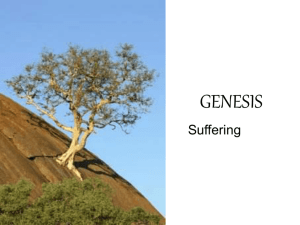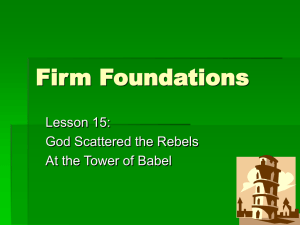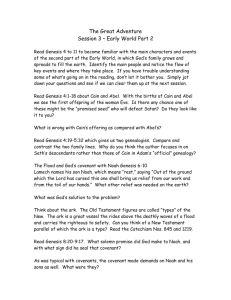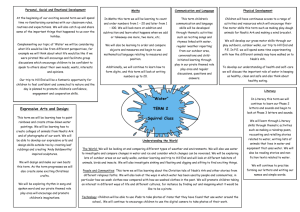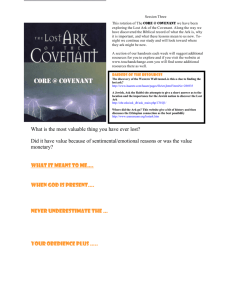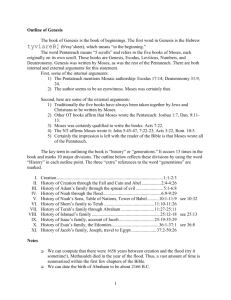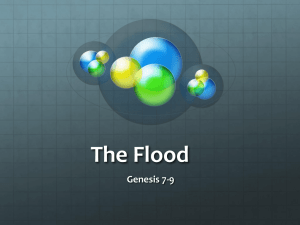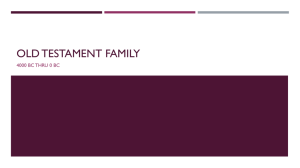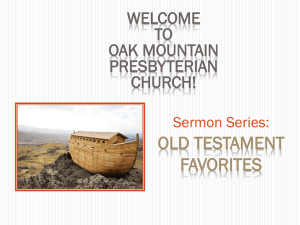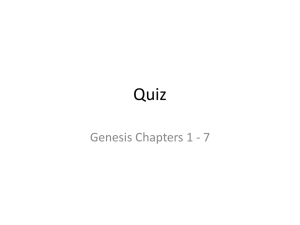The Hebrew Bible
advertisement
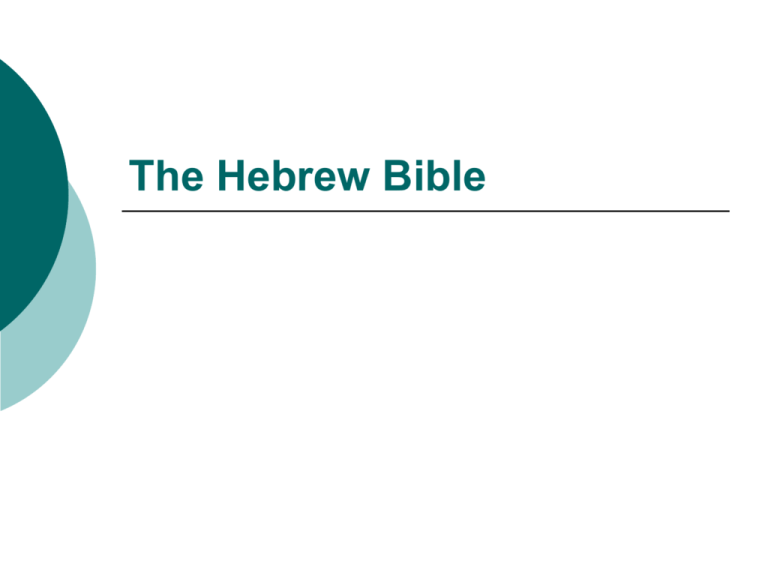
The Hebrew Bible Overview Time of Composition: 1000-300 B.C.E. The Hebrew Bible encompasses a variety of texts from different periods. These texts are composed in poetry and prose, sometimes in a mixture of both. They include historical narratives, short story, genealogy, proverbs, laws, visionary narratives and many kinds of lyric poetry. Together they tell the story of the Jewish people in different modes and from different perspectives. Genesis (1) The Book of Genesis forms part of an interconnected group of writings that are central to Jewish belief and are known collectively in Hebrew as the Torah (meaning “instruction,” “guidance,” or “law”). They are also often called the Pentateuch (“five scroll”). Genesis (2) The narrative parts of the Torah told a continuous story, from the creation of the world to the sojourn in Egypt, the Israelites’ exodus from Egypt, their subsequent wandering led by Moses, and finally Moses’ death just before the entry into the Promised Land. Embedded within this narrative are laws given by God to Moses, and passed on by Moses to his people. Genesis (3) The law is central because it defines the Jews’ relation to God. Moses dominates the Torah and Jewish tradition as the intermediary through whom God gave the law to his people. The book falls into two parts. The first part (chapters 1-11) recounts “creation story”—God’s creation of the world and of humankind, and the evolution of early human society. Genesis (4) This early stage is marked especially by human wrongdoing and God’s punishment. In the second part of Genesis (chapters 12-50), the focus shifts from humanity in general to four generations of ancestors of the people of Israel. In the transition between the two parts, a passage at the beginning of chapter 12 plays a pivotal role. Genesis (5) When God tells Noah’s descendant Abram to go forth from his land to the land that He will show him (the Promised Land), it is the first statement of God’s covenant with Israel. In Genesis, the land is left again and again, and the attainment of a settled home in it is deferred beyond the end of the Torah. A Note on the Translation of the Hebrew Bible There are many translations of the Hebrew Bible. The King James or authorized version of 1611 was the work of a team of 54 scholars named by King James I of England. The King James version remains one of the greatest literary text in the history of the English language. The Creation Story (1) God created the world in six days and ceased on the seventh day from all the work He had done. On the first day, God created light by commanding “Let there be light.” He called the light Day, and the darkness Night. The Creation Story (2) On the second day, God made the sky, and called it Heaven. On the third day, God created land and seas; He made the earth to produce all kinds of plants, grass, and trees, shrubs and flowers. On the fourth day, God made the Sun, the Moon, and the Stars and set times for days and years. The Creation Story (3) On the fifth day, God filled the seas with fishes and other water animals. In to the air above the earth He put many birds of all kinds and colors and sizes. On the sixth day, God created all the other animals, large and small. Towards the end of the sixth day, God created the human in his own image. He created male and female and said to them, “Be fruitful and multiply and fill the earth and conquer it.” The Creation Story (4) God also gave the human the power of speech and He made the human superior to all other creatures of the earth. God placed all the creatures of the earth and the powers of nature in the control of the human. God rested on the seventh day. God blessed the seventh day and hallowed it. Adam and Eve (1) Another story of the creation of the human: God created the human from the soil and blew into his nostrils the breath of life. God then planted a garden in Eden and made the human to till the garden and watch. He commanded the human to stay away from the tree of knowledge, good and evil. He said that if the human ate the fruit of this tree, he would be doomed to die. Adam and Eve (2) God created animals from the soil so that the human would not be alone. God took one of the human’s ribs and created a woman to keep him company. The serpent tricked the woman into eating fruit from the forbidden tree. God cursed the serpent, the woman, and the human; and He drove the human and his woman from the garden of Eden. Noah’s Ark (1) God saw that human beings were corrupt and decided to wipe out the human race. Noah was a righteous man and God told Noah to build an ark to save himself, his wife, his sons, and the wives of his sons. He also told Noah to bring a pair of each kind of animals and birds to the ark. Then God flood the earth with heavy rains for forty days and forty nights. Noah’s Ark (2) All living things outside the ark perished. The waters surged over the earth one hundred and fifty days. When the waters subsided, Noah ascertained its condition by means of a raven and a dove sent out from the ark. Noah obeyed the Divine command to leave the ark, built an altar, offered sacrifice, and made a covenant with God. References http://www.chabad.org/library/articl e_cdo/aid/246605/jewish/Creationof-the-World.htm http://en.wikipedia.org/wiki/Genesi s_creation_narrative http://en.wikipedia.org/wiki/Adam_ and_Eve http://www.newadvent.org/cathen/ 04702a.htm http://en.wikipedia.org/wiki/Noah% 27s_Ark http://en.wikipedia.org/wiki/Deluge _myth
